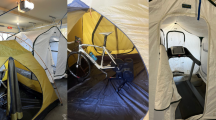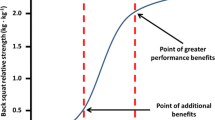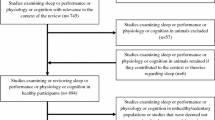Abstract
An optimal psychologic state for peak athletic performance is strongly documented in the sport psychology literature. A wealth of peer-reviewed studies also strongly supports the role that mental skills training (MST) plays in the development of this state. However, some disagreement exists in the sport psychology community over how best to deliver the MST tools and skills necessary for optimal sport performance. Mental training consultants and intervention researchers have recently suggested that periodization of mental training may be the next major leap forward in applied sport psychology program delivery. This new method of “training the mind” is presented and discussed.
Similar content being viewed by others
References and Recommended Reading
Ravizza K: Peak experiences in sport. J Humanist Psychol 1977, 17:35–40.
Orlick T, Partington J: Mental links to excellence. Sport Psychol 1988, 2:105–130.
Williams J, Krane V: Psychological characteristics of peak performance. In Applied Sport Psychology. Personal Growth to Peak Performance. Edited by Williams J. Mountain View, CA: Mayfield; 2001:162–178. Recent review of peak performance literature in sport. Discusses literature related to flow, differences between successful and unsuccessful athletes, and psychologic skills and peak performance.
Jackson SA: Athletes in flow: a qualitative investigation of flow states in elite figure skaters. J Appl Sport Psychol 1992, 4:161–180.
Jackson SA: Toward a conceptual understanding of theflow experience in elite athletes. Res Q Exerc Sport 1996, 67:76–90.
Jackson SA, Csikszentmihalyi M: Flow in Sports. Champaign, IL: Human Kinetics; 1999. Excellent book written in a popular style that applies flow constructs to sport performance.
Csikszentmihalyi M: Flow: The Psychology of Optimal Experience. New York: Harper & Row; 1990.
Burton D: The impact of goal specificity and task complexity on basketball skill development. Sport Psychol 1989, 3:34–47.
Burton D, Weinberg R, Yukelson D, Weigand D: The goal effectiveness paradox in sport: examining the goal practices of collegiate athletes. Sport Psychol 1998, 12:404–418.
Kyllo L, Landers D: Goal setting in sport and exercise: a research synthesis to resolve the controversy. J Sport Exerc Psychol 1995, 17:117–137.
Weinberg R: Goal setting and performance in sport and exercise settings: a synthesis and critique. Med Sci Sport Exerc 1994, 26:469–477.
Jones L, Stuth G: The uses of mental imagery in athletics: an overview. Appl Prevent Psychol 1997, 6:101–115.
Martin KA, Hall CR: Using mental imagery to enhance intrinsic motivation. J Sport Exerc Psychol 1995, 17:54–69.
Munroe KJ, Giacobbi PR, Hall C, Weinberg R: The four Ws of imagery use: where, when, why, and what. Sport Psychol 2000, 14:119–137.
Kearns D, Crossman J: Effects of a cognitive intervention package on the free-throw performance of varsity basketball players during practice and competition. Percept Mot Skills 1992, 75:1243–1253.
Maynard IW, Smith MJ, Warwick-Evans L: The effects of a cognitive intervention strategy on competitive state anxiety and performance in semiprofessional soccer players. J Sport Exerc Psychol 1995, 17:428–446.
Crocker P: Evaluating stress management training under competition conditions. Int J Sport Psychol 1989, 20:191–204.
Gould D, Udry E: Psychological skills for enhancing performance: arousal regulation strategies. Med Sci Sport Exerc 1994, 26:475–478.
Gould D, Eklund R, Jackson S: Coping strategies used by more versus less successful US Olympic wrestlers. Res Q Exerc Sport 1992, 64:83–93.
Feltz D: Self-confidence and sport performance. Exerc Sport Sci Rev 1988, 16:423–458.
Hanton S: Perceived control of anxiety and its relationship to self-confidence and performance. Res Q Exerc Sport 2002, 73:87–97.
Beauchamp P, Halliwell W, Fournier J, Koestner R: Effects of cognitive-behavioral mental skills training on the motivation, preparation, and putting performance of novice golfers. Sport Psychol 1996, 10:157–170.
Davis K: Performance enhancement program for a college tennis player. Int J Sport Psychol 1991, 22:140–164.
Ming S, Martin GL: Single-subject evaluation of a self-talk package for improving figure skating performance. Sport Psychol, 3:227–238.
Wrisberg C, Anshel M: The use of positively worded performance reminders to reduce warm-up decrement in the field hockey penalty shot. J Appl Sport Psychol 1997, 9:229–240.
Jones G, Hardy L: Stress in sport: experiences of some elite performers. In Stress and Performance in Sport. Edited by Jones G, Hardy L. Chichester, UK: Wiley; 1990:247–277.
Gould D, Guinan D, Grenleaf C, et al.: Factors affecting Olympic performance: perceptions of athletes and coaches from more and less successful teams. Sport Psychol 1999, 13:371–394. Excellent paper that identifies the factors most related to top performance with US Olympians. Positive factors related to performance included self-confidence, adherence to mental plans, and team cohesion.
Greenspan MJ, Feltz D: Psychological interventions with athletes in competitive situations: a review. Sport Psychol 1989, 3:219–236.
Weinberg RS, Gould D: Foundations of Sport and Exercise Psychology, edn 3. Champaign, IL: Human Kinetics; 2003.
Weinberg RS, Williams JM: Integrating and implementing a mental skills training program. In Applied Sport Psychology. Personal Growth to Peak Performance. Edited by Williams J. Mountain View, CA: Mayfield; 2001:347–373.
Gould D, Tammen V, Murphy S, May J: An examination of US Olympic sport psychology consultants and the services they provide. Sport Psychol 1989, 3:300–312.
Vealey R: Future directions in mental skills training. Sport Psychol 1988, 2:318–336.
Suinn RM: The 1984 Olympics and sport psychology. J Sport Psychol 1985, 7:321–329.
Bull SJ: Personal and situational influences on adherence to mental skills training. J Sport Exerc Psychol 1991, 13:121–132.
Munzert J, Hackfort D: Individual preconditions for mental training. Int J Sport Psychol 1999, 30:41–62.
Balague G: Periodization of mental skills training. J Sci Med Sport 2000, 3:230–237.
Gould D, Murphy S, Tammen V, May J: An evaluation of US Olympic sport psychology consultant effectiveness. Sport Psychol 1991, 5:111–127.
Vealey R: Current status and prominent issues in sport psychology interventions. Med Sci Sport Exerc 1994, 26:495–592.
Boucher SH, Rotella RJ: A psychological skills education program for closed-skill performance enhancement. Sport Psychol 1987, 1:127–137.
Taylor J: Applying mental skills training to the specific needs of athletes and the particular demands of the sport. Proceedings of VIII World Congress of International Society of Sport Psychology. Lisbon; June 22–27, 1993:405–409.
Danish SJ, Hale BD: Toward an understanding of the practice of sport psychology. J Sport Psychol 1981, 3:90–99.
Leffingwell TR, Rider SP, Williams JM: Application of the transtheoretical model to mental skills training. Sport Psychol 2001, 15:168–187.
Prochaska JO, DiClemente CC: Toward a comprehensive model of change. In Treating Addictive Behaviors: Processes of Change. Edited by Miller WR, Heather N. New York: Plenum; 1986:3–27.
Grove JR, Norton PJ, Van Raalte JL, Brewer BW: Stages of change as an outcome measure in the evaluation of mental skills training programs. Sport Psychologist 1999, 13:107–116.
Burton D, Hammermeister JJ, Holliday B, Naylor S: Issues and future directions in periodization of mental training. Periodization of mental training: smoke and mirrors or wave of the future? Proceedings of the Association for the Advancement of Applied Sport Psychology. Nashville, TN; October 18–22, 2000.
Bompa T: Periodization: Theory and Methodology of Training. Champaign, IL: Human Kinetics; 1999.
Hammermeister JJ: Impact of a periodized MST program on the enjoyment and quality of mental training for US Nordic skiers and coaches. Proceedings of the Association for the Advancement of Applied Sport Psychology. Nashville, TN; October 18–22, 2000.
Anderson S, Hammermeister JJ: Analysis of a periodized mental skills delivery model for the Cross-Country National Development Group of the USSA. Proceedings of the Association for the Advancement of Applied Sport Psychology. Philadelphia, PA: October 8–11, 2003.
Author information
Authors and Affiliations
Rights and permissions
About this article
Cite this article
Hammermeister, J., VonGuenthner, S. Sport psychology: Training the mind for competition. Curr Sports Med Rep 4, 160–164 (2005). https://doi.org/10.1007/s11932-005-0061-1
Published:
Issue Date:
DOI: https://doi.org/10.1007/s11932-005-0061-1




